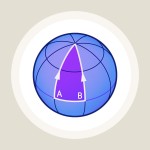Dictionary
numerical relativity
Subdiscipline of physics devoted to the use of computer simulations for exploring the structure and consequences of Einstein’s theories, special and general relativity.
Notably, the centerpiece of general relativity are Einstein’s equations, which relate certain properties of the matter contained in a spacetime to that spacetime’s geometry. A model universe in which matter distorts the geometry – and is in turn influenced by those distortions – in exactly the way prescribed by Einstein’s equations is called a solution of these equations. Some simple solutions can simply be written down on a piece of paper (“exact solutions”). More complicated situations can only be described by simulating space, time and matter in a computer (“numerical solution”), and this is one of the main tasks of numerical relativity.
Numerical relativity has led to interesting results about black holes and gravitational waves, for instance about the gravitational wave produced when two black holes collide and merge. They have also shed light on what general relativity predicts for the properties of spacetime close to a black hole’s central singularity (further information about this can be found in the spotlight text Of singularities and breadmaking). The branch of numerical relativity that is of interest for the study of phenomena such as supernovae, jets, and merging or collapsing neutron stars is relativistic (magneto-)hydrodynamics, more about which can be found in the spotlight text The realm of relativistic hydrodynamics.










